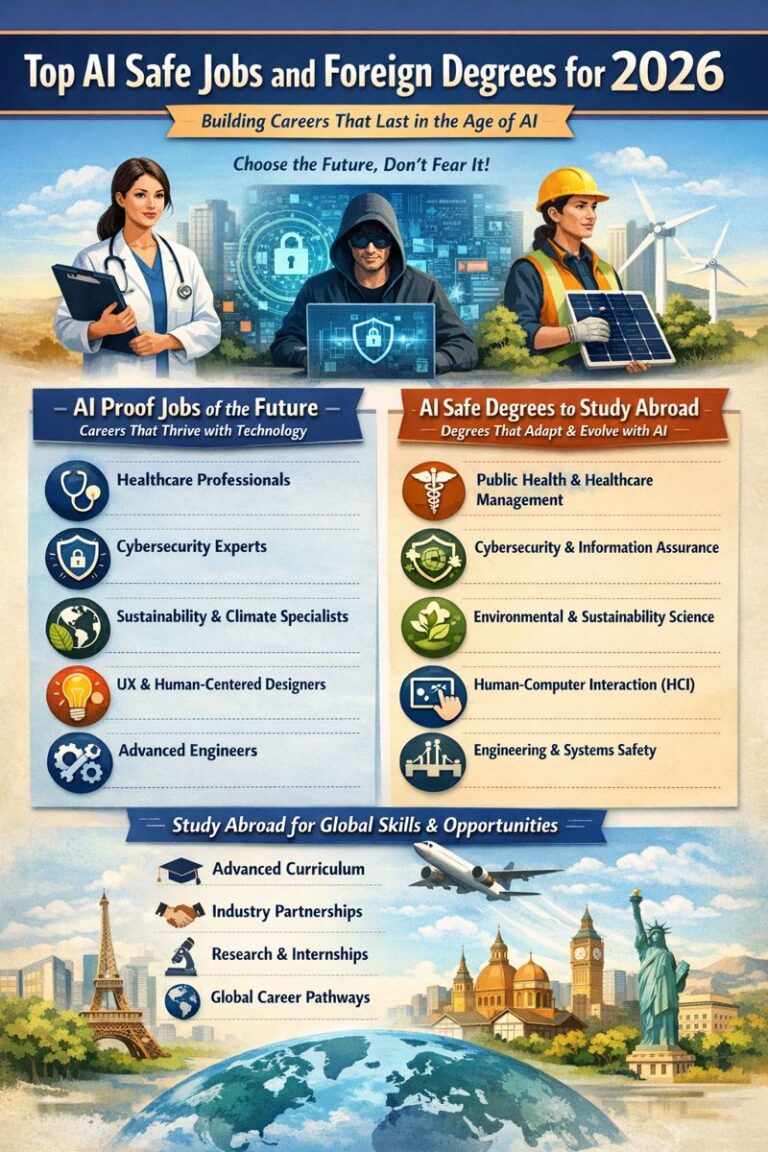Learning the practical aspects of a job before graduating can have a huge outcome on your employment prospects. Most employers want fresh graduates who have some experience in the real world.
Co-op programs at many USA universities provide an experience that fills your resume and opens doors to interview opportunities. Employers are far more likely to hire you if you have a few months of work experience.
In this article, we explore the importance of co-op master’s programs in the USA for Indian students pursuing postgraduate degrees abroad.

How Co-op Master’s Programs Work in the USA
A Co-op Program is short for a Co-operative Education Program. It is an innovative educational approach that is followed by many universities in the USA.
A co-op program seamlessly merges academic study with hands-on work experience. By alternating between classroom learning and paid work in their field, students gain a competitive edge in the job market.
You will become an integral part of the team at the company you select during your co-op. You’ll be paired with a dedicated manager who will provide personalized training, guidance, and support to ensure your success. Your manager will assign projects that match your skills and interests which allows you to apply your knowledge in a real-world setting.
In this role, you might lead your own project or be part of a larger initiative. This leads to gaining hands-on experience and building your professional portfolio. Throughout your work term, a university co-op advisor will check in regularly to ensure your progress.
Key Features of Co-op Master’s Programs in the USA
- Work-Study Balance
Co-op programs allow students to alternate between full-time work and study terms. The cycle repeats throughout their university career. This balance provides a frictionless transition between theoretical learning and practical application.
- Paid Learning Experience
Co-op placements offer valuable paid experience and allow students to earn a salary while gaining industry insights. This financial support reduces the burden of tuition and living expenses.
- Industry-Relevant Experience
Co-op programs provide students with work experience that is related to their field of study. By applying knowledge gained in the classroom to real-world scenarios a student develops relevant problem-solving skills.
- Professional Networking
Co-op programs offer excellent opportunities to build professional connections with employers and managers. These connections can lead to job offers and valuable references.
- Graduation Timeline
While co-op programs may prolong graduation time, students gain both a degree and significant work experience. This is useful and enhances their career prospects in a competitive job market.
- Career Development
Co-op programs can act as a career launchpad. It helps students have clarity on career goals, and build strong resumes. Essentially the student understands what qualities prospective employers are looking for.
Also Read: Study Abroad Guide for Indian Students 2025
Compensation for Co-op Master’s programs in the USA
Co-op students are paid for their work terms. Employers understand the value students bring and provide fair compensation for their contributions.
Co-op programs are designed to be mutually beneficial and while students gain practical experience, employers access fresh talent.
Types of Compensation
Co-op students can receive various forms of compensation, including:
Salaries
Most co-op students receive a monthly salary, ranging from $2,000 to $4,000. This depends on the organization, location, and industry.
Hourly Wages
Some employers pay students an hourly wage, typically between $15 to $30 per hour.
Stipends
In some cases, students receive a stipend or allowance to cover living expenses.
Factors Influencing Compensation
Several factors impact co-op compensation and influence the amount students can expect to earn.
Industry Type
Fields like engineering, computer science, and finance offer higher salaries due to industry demand. Students in these fields have highly specialized skills and can expect more competitive compensation.
Location
A co-op opportunity in cities with a high cost of living, such as New York or San Francisco, brings higher compensation. Students need to maintain a comfortable standard of living and life is more expensive in some cities.
Employer Size
Large corporations often pay more than smaller organizations or startups since they have greater financial resources and better compensation structures.
Student Level
Postgraduate students receive higher compensation than undergraduate students due to their advanced education and skills. Besides, students with prior work experience may receive higher salaries.
While compensation is essential, it must never be the only yardstick with which to measure the experience.
In the next section, we look at the benefits of co-op master’s programs in the USA.
Also Read: 5 Most Affordable Universities in the USA for Indian Students
Benefits of Participating in a Co-op Program
Co-op programs give students a head start by bringing together academic learning with professional experience and paving the way for future success. Here are the principal benefits of co-op programs:
- Practical Experience
Co-op programs provide hands-on experience and allow students to apply theoretical knowledge in real-life scenarios. This experience improves their understanding of the domain.
- Financial Benefits
Students are paid during co-op and this reduces their financial burden and dependence on financial aid. Extra earning enables students to focus on their studies and career development with peace of mind.
- Enhanced Employability
Graduating with work experience makes students more attractive to future employers. Co-op programs provide an advantage and improve the likelihood of job offers and a successful beginning to a career.
- Academic Credits
Many co-op programs offer academic credits or certification and offer due recognition of the skills gained during the work term. This integration of academic and professional experience enriches students’ educational journeys.
- Skill Development
Co-op programs also improve essential soft skills, such as communication in a professional environment. These skills make students effective collaborators in the workplace.
Also Read: Best Exams to Study in USA for Indian Students 2025 (Masters & UG)
Co-op vs Internship vs Work Study: Understanding the Differences
Both academic study and hands-on experience are desirable in a resume. Co-ops, internships, and work-study programs are three common pathways that provide both.
Though they may seem similar, each is a little different and it is important to understand the distinctions before you choose a program.
Co-operative Education (Co-op)
Co-operative education, or co-op, brings together classroom learning with full-time, paid work experience in a student’s field of study.
This occurs through alternating semesters of academic coursework and full-time work.
- Duration
Co-op programs typically last six months to one year, and allow students to gain extensive experience in their field. This enables students to take on significant responsibilities and contribute to long-term projects.
- Paid Positions
Co-op positions are generally well-paid and give students sufficient financial compensation while they gain experience. This financial support is crucial for many students.
- Academic Credit
Many co-op programs offer academic credit for work experience. There is recognition of the learning that occurs on the job. This enhances the educational value of the co-op experience.
- Internship
An internship provides short-term work experience, typically lasting a few weeks to months. Internships can be part-time or full-time and usually take place over summer break.
The principal difference is that a co-op is longer in duration and usually pays more. However, the two terms are often used interchangeably.
Also a co-op arrangement is with the same employer while the student may choose to intern with multiple employers over his/her course.
- Work-Study
Work-study programs are government-funded financial aid initiatives that help graduate students with financial need with part-time jobs.
These programs aim to assist the student in covering education-related expenses, including tuition. Work-study jobs range from 10-20 hours per week and can be on-campus or off-campus.
A candidate has to apply through Free Application for Federal Student Aid (FAFSA) and this almost automatically disqualifies students who do not have citizenship or whose parents do not have citizenship. Practically speaking an Indian student is not eligible for a work-study program.
Top universities offering STEM Co-op programs
According to U.S. News’ Spring 2023 survey, these premier institutions in the USA provide career readiness through robust co-op programs:
| Serial Number | Name | Ranking as per U.S. News | Overview |
| 1 | Georgia Institute of Technology | 33 (tie), National Universities | Offers an optional five-year co-op program for engineering students, alternating between work and academic study. |
| 2 | Purdue University—West Lafayette | 43 (tie), National Universities | Offers a three- to five-session co-op program with the same employer, allowing students to build experience and responsibility over time. |
| 3 | Northeastern University (MA) | 53 (tie), National Universities | Offers a co-op program with full-time jobs alternating with academic study. Co-op participation is optional, but most students take part after a preparation course. |
| 4 | Worcester Polytechnic Institute | 82 (tie), National Universities | Offers paid, non-credit co-ops lasting up to eight months. |
| 5 | Clemson University (SC) | 86 (tie), National Universities | Provides co-op opportunities, as well as international internships in Australia, Ireland, Italy, Portugal, and Spain. |
| 6 | Drexel University (PA) | 98 (tie), National Universities | Requires students to complete one to three co-ops, depending on their major, with each lasting six months. |
| 7 | Rochester Institute of Technology | 98 (tie), National Universities | Many programs require co-ops. More than 4,500 students participate annually in co-ops, working at least 35 hours a week. |
| 8 | University of Cincinnati (OH) | 142 (tie), National Universities | Requires co-op participation for certain majors, usually three to five semesters of full-time work. |
How to choose the right Co-op program in the USA
Selecting the right co-op program will influence your career trajectory. To make an informed decision, consider the following key factors:
Alignment with Your Career Vision
Define your desired field and make sure the co-op program aligns with your long-term career objectives. This clarity will help you narrow down suitable co-op programs. After all, all the effort is not for experience but the right kind of experience.
Research and Evaluate Programs
Investigate the institution’s reputation and industry connections to ensure academic and practical balance. Explore what alumni have to say about the co-op program before you commit.
Industry Partnerships and Opportunities
Seek programs with strong company connections and diverse placement options to enhance networking and career advancement. This will increase your chances of securing a valuable co-op position. In the case of postgraduation, you need a co-op employment that fits precisely your domain otherwise it is wasted time and effort.
Support Services and Resources
Look for programs offering career counseling, resume workshops, and interview preparation. A strong faculty and alumni network can provide mentoring and job opportunities. Adequate support services will help you succeed in your co-op and beyond.
Location Considerations
Consider proximity to major industries and business hubs for increased opportunities. You must assess the cost of living and what effect it has on your co-op experience. Location is an important factor because it influences networking potential.
Student Feedback
Review testimonials and success stories from current and past students and gain insights into the program. This will help you make an informed decision and have realistic expectations. Student feedback through social media can provide a useful perspective.
Financial Implications
Investigate stipends, pay rates, and potential tuition credits when you evaluate the program’s benefits. Take into consideration how these factors will impact your career. The quantum of pay can have a large influence on your co-op experience.
Application and Selection Process
Familiarize yourself with the application requirements and deadlines. Prepare for interviews to increase your chances of selection. Understanding the application process will help you present yourself effectively and showcase your potential.
With so many factors to consider, choosing the right co-op program can become complex. That’s where SelectRight (by GradRight) can help.
SelectRight analyzes over 8 million data points across 40,000 programs and considers critical factors such as career alignment, industry partnerships, financial implications, and location.
Here’s how SelectRight works:
- Start by creating your free profile on the platform.
- Input your academic background, career goals, and financial preferences.
- SelectRight’s algorithm compares your profile with various co-op programs and provides a custom list of the best matches.
- Use detailed insights on alumni outcomes, placement opportunities, and program strength to make your decision.
- Get guidance from unbiased experts to help you choose the ideal program.
Sign up today and let SelectRight simplify your search for the perfect co-op program in the USA.
Also Read: Top Public Universities in the USA 2024-25: Rankings, Tuition Fees, Eligibility & More
FAQs
1. What is a co-op program for a master’s degree in the USA?
A Co-op (Co-operative Education) program for a master’s degree in the USA brings together academic studies in the classroom with hands-on work experience. The program alternates between periods of academic coursework and paid work experience.
Co-op programs in the USA are usually 2-3 years long, including 1-2 years of coursework and 1-2 co-op work periods. Those who graduate have a definite edge in the job market due to the huge experience they have gathered.
2. Do universities in the USA offer co-op programs?
Yes, many universities in the United States offer co-op programs, including:
– Georgia Institute of Technology
– Drexel University
– Purdue University
– Northeastern University
– Rochester Institute of Technology
– Clemson University
– Elon University
– George Washington University
3. Are international students eligible for co-op programs in the USA?
Yes, there is no bar for international students participating in co-op programs in the USA. these programs are the reason why so many students take up these programs.
4. Are co-op programs available in master’s degree programs?
There are co-op programs for master’s degrees. Note that more co-op programs are offered in STEM programs than in other fields.


















